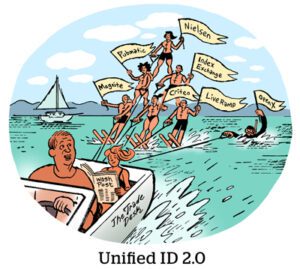Here’s today’s AdExchanger.com news round-up… Want it by email? Sign up here.
Time Will Telco
There’s plenty of pressure on Brian Lesser to build advertising into a pillar of AT&T’s business and marry the wireless company’s customer data to the new WarnerMedia content assets. “But probably more than anything, I feel this sense of responsibility to the advertising community,” Lesser tells Jeanine Poggi of Ad Age. One reason for optimism is that AT&T’s “AdCo,” the interim name that’s been used to brand the advertising and analytics group, seems to have stronger buy-in from AT&T brass than previous telco-media-advertising ventures, like Comcast’s NBCUniversal acquisition or Oath by Verizon. “I felt pretty optimistic that, assuming the politics doesn’t stand in his way – you can’t underestimate that – there’s a good chance of him making something happen,” said David Cohen, Magna’s president for North America, following AT&T’s TV upfronts pitch. “It feels like AT&T’s CEO is giving him keys to the kingdom.” More.
Show To Advantage
The sales and marketing software company Advantage Solutions acquired the Jun Group, a 10-year-old mobile video advertising startup. Terms weren’t disclosed, though the Jun Group had raised $33 million in venture capital. Jun Group’s tech is embedded in mobile apps, and uses opt-in poll questions to vet for human traffic and create custom audience segments. Advantage plans to apply the tech to MomentAware, a shopper marketing product that enables retailers and CPGs to target shoppers based on real-time geolocation data. Press release.
Border Patrol
Should the EU’s “right to be forgotten” extend beyond its legislative borders? Google is appealing a 2015 order by the French data protection authority, CNIL, arguing that it should. CNIL fined Google roughly $116,000 for failing to comply with the order, but Google is arguing that allowing people to remove their names from search results could lend dictators too much control over censorship. It’s not the first ethical debate that tech platforms and governments have had over censorship of the borderless internet, The Wall Street Journal reports. “It’s a clash between the way data is managed and moved around, which doesn’t respect borders, and efforts by territorial governments to impose their norms and rules,” says American University law professor Jennifer Daskal. More.
But Wait, There’s More!
- States Loom As Regulatory Threat To Tech Giants – WSJ
- LinkedIn Makes Dynamic Ads Available Via Campaign Manager – blog post
- Facebook And Its Users Are Telling Different Stories – Bloomberg
- Pinterest: 250 Million People Now Use Us Each Month – blog
- Deloitte Acquires Magnetic’s AI Platform Business – release
- What Types Of Data Will GDPR Impact Most – eMarketer
- Apple Is Pitching Newspapers On Its Subscription Service – Recode
- BILD Group Inks Tech Partnership With Taboola – release
- Still-New Facebook Stories Attracts With Low CPMs – Digiday
You’re Hired!
















